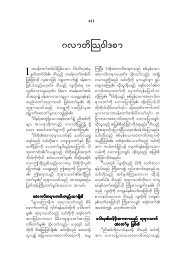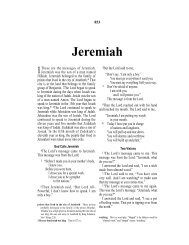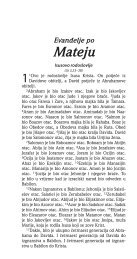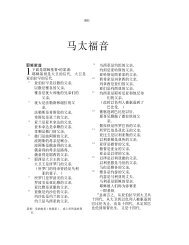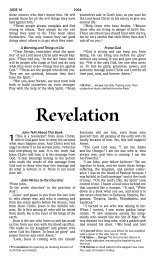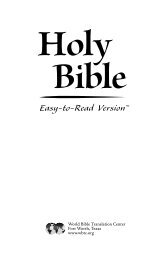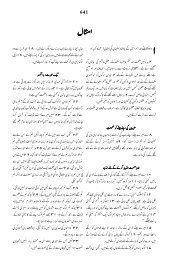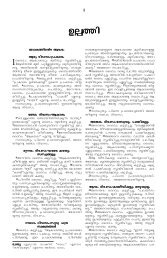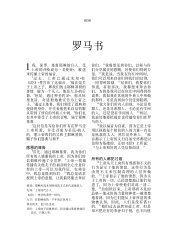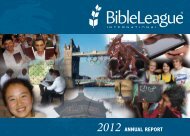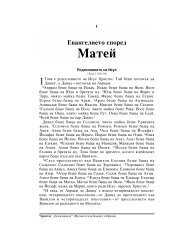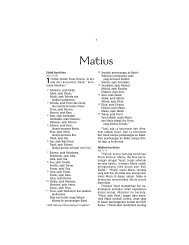English Version for the Deaf
English Version for the Deaf
English Version for the Deaf
You also want an ePaper? Increase the reach of your titles
YUMPU automatically turns print PDFs into web optimized ePapers that Google loves.
ix INTRODUCTION<br />
THE LAW OF MOSES<br />
God’s rescue of <strong>the</strong> people of Israel and his agreement with <strong>the</strong>m at Mount Sinai set<br />
this nation apart from all o<strong>the</strong>rs. This agreement contained promises and laws <strong>for</strong><br />
<strong>the</strong> people of Israel. A part of this agreement, known as <strong>the</strong> Ten Commandments,<br />
was written by God on two stone tablets and given to <strong>the</strong> people. These commands<br />
contain <strong>the</strong> basic principles <strong>for</strong> <strong>the</strong> kind of life God wanted <strong>the</strong> people of Israel to<br />
live, including <strong>the</strong>ir duty to God, family, and o<strong>the</strong>rs.<br />
The Ten Commandments and <strong>the</strong> rest of <strong>the</strong> rules and teachings given at Mount<br />
Sinai became known as “<strong>the</strong> Law of Moses” or simply “<strong>the</strong> law.” Many times <strong>the</strong>se<br />
terms are used to refer to <strong>the</strong> first five books of <strong>the</strong> Scriptures and often to <strong>the</strong> entire<br />
Old Testament.<br />
Besides <strong>the</strong> Ten Commandments and o<strong>the</strong>r rules of conduct, <strong>the</strong> Law of Moses contains<br />
rules about priests, sacrifices, worship, and holy days. These rules are found<br />
in <strong>the</strong> book of Leviticus. According to <strong>the</strong> Law of Moses, all priests and <strong>the</strong>ir<br />
helpers came from <strong>the</strong> tribe of Levi. These helpers were called “Levites.” The most<br />
important priest was called <strong>the</strong> high priest.<br />
The Law of Moses included instructions <strong>for</strong> building <strong>the</strong> Holy Tent (“Tabernacle”),<br />
or Meeting Tent, <strong>the</strong> place where <strong>the</strong> people of Israel went to worship God. It also<br />
has instructions <strong>for</strong> making all <strong>the</strong> things to be used in <strong>the</strong>ir worship. This prepared<br />
<strong>the</strong> Israelites <strong>for</strong> <strong>the</strong> building of <strong>the</strong> Temple, <strong>the</strong> holy building in Jerusalem on Mount<br />
Zion, where <strong>the</strong> people would later go to worship God. The rules about sacrifices<br />
and worship <strong>for</strong>ced <strong>the</strong> people to see that <strong>the</strong>y sinned against each o<strong>the</strong>r and against<br />
God. But <strong>the</strong>y also gave <strong>the</strong> people a way to be <strong>for</strong>given and to be reunited with one<br />
ano<strong>the</strong>r and with God. These sacrifices prepared <strong>the</strong> way <strong>for</strong> a better understanding<br />
of <strong>the</strong> sacrifice God was preparing to give <strong>for</strong> all <strong>the</strong> people of <strong>the</strong> world.<br />
The Law of Moses also contained instructions <strong>for</strong> celebrating a number of holy<br />
days or festivals. Each festival had its own special meaning. Some festivals were<br />
happy occasions to celebrate special times of <strong>the</strong> year, especially harvest times.<br />
These included <strong>the</strong> Festival of Weeks and <strong>the</strong> Festival of Shelters in <strong>the</strong> fall. (See<br />
<strong>the</strong>se terms in <strong>the</strong> Word List.)<br />
O<strong>the</strong>r festivals were <strong>for</strong> remembering <strong>the</strong> wonderful things God had done <strong>for</strong> his<br />
people. Passover was this kind of holy day. Each family relived <strong>the</strong> escape from<br />
Egypt, ga<strong>the</strong>ring in <strong>the</strong>ir homes to remember this part of Israel’s history and to sing<br />
songs of praise to God. A lamb was slaughtered and <strong>the</strong> meal prepared. Each cup of<br />
wine and piece of food reminded <strong>the</strong> people of <strong>the</strong> things God had done to save<br />
<strong>the</strong>m from a life of pain and sadness.<br />
One holy day, in particular, was very serious. Every year, on <strong>the</strong> Day of Atonement,<br />
<strong>the</strong> people had to remember <strong>the</strong> many wrong things <strong>the</strong>y had done to o<strong>the</strong>rs and to<br />
God. This was a day of sadness, and <strong>the</strong> people did not eat. But on that day <strong>the</strong> high<br />
priest offered special sacrifices to “cover over” or atone <strong>for</strong> <strong>the</strong>ir sins.<br />
The agreement between God and Israel was very important to <strong>the</strong> writers of <strong>the</strong> Old<br />
Testament. Almost all of <strong>the</strong> books of <strong>the</strong> Prophets and Holy Writings are based on<br />
<strong>the</strong> fact that <strong>the</strong> nation of Israel, and every citizen of Israel, had made a very special<br />
agreement with <strong>the</strong>ir God. They called it <strong>the</strong> “agreement of <strong>the</strong> LORD” or simply



